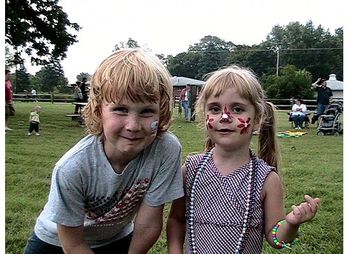Restoring Play and Art Education in Kindergarten

Grant and Madeline
“Education is not the filling of a bucket, but the lighting of a fire” ~William Butler Yeats
The Art of Play is a play-based and art education resources for parents and educators of kindergarten aged children. Research proves that a play-based education is beneficial in early childhood education. All too often, children don't get the opportunity to learn through play in today's kindergarten classrooms. It's been said that Kindergarten is the New First Grade. Policies such as No Child Left Behind and standardized testing have robbed young children of the chance to learn through play and experimentation.
Young children are naturally geared towards hands on learning. Art education in the classroom and in the home helps them learn problem-solving skills that will take them through the rest of their school years and on into adulthood.
An art/play based curriculum will help to develop the next generation of critical thinkers, because it inspires students to instinctively problem solve using creative thinking. The objective is to encourage them to constantly question and search for solutions using a variety of techniques and tools. These skills are the seeds to the blossoming creativity of their futures.
The Hundred Languages of Children
The child is made of one hundred.
The child has
a hundred languages
a hundred hands
a hundred thoughts
a hundred ways of thinking
of playing, of speaking.
A hundred. Always a hundred
ways of listening
of marveling, of loving
a hundred joys
for singing and understanding
a hundred worlds
to discover
a hundred worlds
to invent
a hundred worlds
to dream.
The child has
a hundred languages
(and a hundred hundred hundred more)
but they steal ninety-nine.
The school and the culture
separate the head from the body.
They tell the child:
to think without hands
to do without head
to listen and not to speak
to understand without joy
to love and to marvel
only at Easter and at Christmas.
They tell the child:
to discover the world already there
and of the hundred
they steal ninety-nine.
They tell the child:
that work and play
reality and fantasy
science and imagination
sky and earth
reason and dream
are things
that do not belong together.
And thus they tell the child
that the hundred is not there.
The child says:
No way. The hundred is there.
-Loris Malaguzzi, Founder of the Reggio Emilia Approach
The Art of Play is a play-based and art education resources for parents and educators of kindergarten aged children. Research proves that a play-based education is beneficial in early childhood education. All too often, children don't get the opportunity to learn through play in today's kindergarten classrooms. It's been said that Kindergarten is the New First Grade. Policies such as No Child Left Behind and standardized testing have robbed young children of the chance to learn through play and experimentation.
Young children are naturally geared towards hands on learning. Art education in the classroom and in the home helps them learn problem-solving skills that will take them through the rest of their school years and on into adulthood.
An art/play based curriculum will help to develop the next generation of critical thinkers, because it inspires students to instinctively problem solve using creative thinking. The objective is to encourage them to constantly question and search for solutions using a variety of techniques and tools. These skills are the seeds to the blossoming creativity of their futures.
The Hundred Languages of Children
The child is made of one hundred.
The child has
a hundred languages
a hundred hands
a hundred thoughts
a hundred ways of thinking
of playing, of speaking.
A hundred. Always a hundred
ways of listening
of marveling, of loving
a hundred joys
for singing and understanding
a hundred worlds
to discover
a hundred worlds
to invent
a hundred worlds
to dream.
The child has
a hundred languages
(and a hundred hundred hundred more)
but they steal ninety-nine.
The school and the culture
separate the head from the body.
They tell the child:
to think without hands
to do without head
to listen and not to speak
to understand without joy
to love and to marvel
only at Easter and at Christmas.
They tell the child:
to discover the world already there
and of the hundred
they steal ninety-nine.
They tell the child:
that work and play
reality and fantasy
science and imagination
sky and earth
reason and dream
are things
that do not belong together.
And thus they tell the child
that the hundred is not there.
The child says:
No way. The hundred is there.
-Loris Malaguzzi, Founder of the Reggio Emilia Approach
